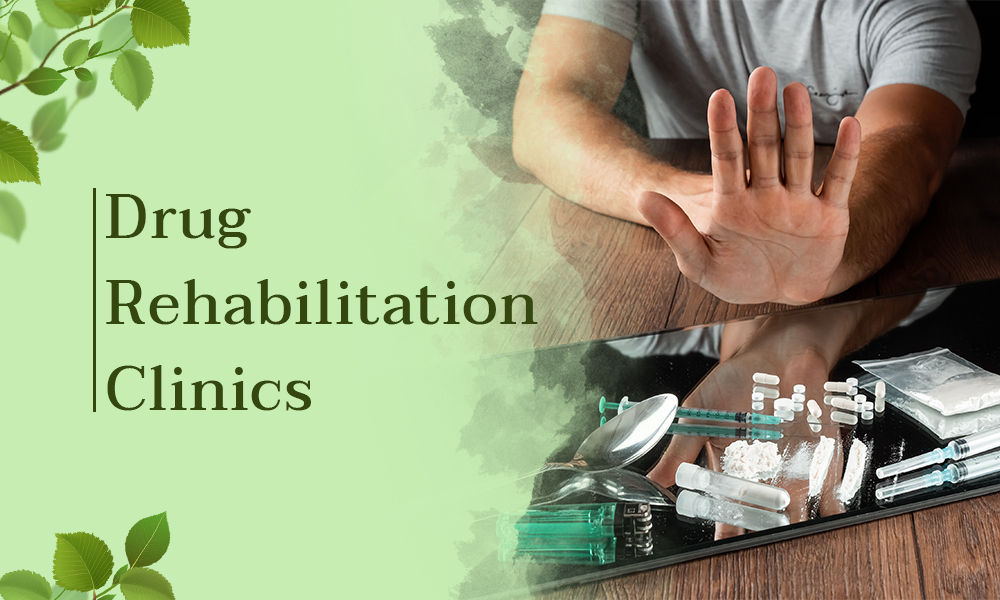- Jofa Tower 5th floor, SB-23, Block 13 C, Main University Rd, Gulshan-e-Iqbal, Karachi.
- +92 322 3746726
- tis@transformation.com.pk
Drug Rehabilitation Clinics

Repetitive Transcranial Magnetic Stimulation (rTMS)therapy benefits
August 7, 2023
Drug Rehabilitation Treatment
August 10, 2023In the relentless fight against drug addiction, drug rehabilitation clinics stand as beacons of hope, providing a haven for healing and renewal. These clinics play a crucial role in supporting individuals seeking to break free from the shackles of substance abuse. Throughout this article, we will delve into the indispensable significance of drug rehabilitation clinics, their comprehensive approach to recovery, and the profound impact they wield in guiding individuals toward a brighter, drug-free future.
Drug rehabilitation clinics are dedicated centers that offer specialized care and support to individuals battling drug addiction. These clinics serve as crucial pillars in the journey toward recovery, providing a structured and nurturing environment that fosters healing and personal growth. These clinics strive to create a supportive and non-judgmental environment where individuals can focus solely on their recovery. This sense of community helps patients feel understood, reduces feelings of isolation, and fosters a sense of belonging that contributes to their overall well-being.

Role of Drug Rehabilitation Clinics:
The role of drug rehabilitation clinics is of paramount importance in addressing the challenges of drug addiction and supporting individuals on their journey to recovery. These clinics play a pivotal role in various aspects of addiction treatment and support, including:
Relapse Prevention Strategies: Drug rehabilitation clinics equip individuals with relapse prevention techniques and coping mechanisms to manage triggers and stressors that could lead to relapse.
Medication Management: Drug rehabilitation clinics may offer medication-assisted treatment (MAT) to help individuals manage cravings and withdrawal symptoms. MAT, when combined with counseling and therapy, can improve health outcomes and increase the chances of successful recovery.
Stress Reduction and Emotional Well-being: Drug rehabilitation clinics provide counseling and therapy sessions that help individuals manage stress, anxiety, and other emotional challenges. Addressing mental health concerns enhances emotional well-being, contributing to a healthier overall state.
Encouraging Healthy Habits: Drug rehabilitation clinics encourage the development of healthy habits and coping mechanisms to replace drug-seeking behaviors. These habits, such as exercise, mindfulness, and relaxation techniques, contribute to improved overall health.
Holistic Approaches: Many drug rehabilitation clinics incorporate holistic therapies such as yoga, meditation, art therapy, and mindfulness practices. These activities promote emotional healing, reduce stress, and help individuals develop a balanced lifestyle.
Nutrition and Wellness: Many drug rehabilitation clinics incorporate nutrition and wellness programs into their treatment plans. A healthy diet, exercise, and other wellness activities support physical health, boost energy levels, and improve overall well-being.
Education on Substance Abuse: Rehab clinics educate individuals about the adverse effects of substance abuse on physical health. Understanding the consequences of drug use motivates individuals to maintain sobriety and prioritize their well-being.

Benefits of Drug Rehabilitation Clinics:
The benefits of drug rehabilitation clinics are multifaceted and extend to individuals, families, and society as a whole. Here are some key advantages:
Improved Physical Health: Drug rehabilitation clinics provide medical supervision during detoxification, ensuring that the withdrawal process is safe and managed effectively. As individuals progress in their recovery, their physical health often improves as they eliminate harmful substances from their bodies.
Enhanced Life Skills: Rehab clinics offer education and skills development programs, empowering individuals to make healthier choices, manage cravings, and avoid relapse. These life skills enable them to navigate the challenges of daily life without resorting to drug use.
Reduced Crime and Legal Issues: By addressing addiction, drug rehabilitation clinics contribute to a decrease in drug-related crime rates and legal issues. As individuals recover, they are less likely to engage in illegal activities to support their addiction.
Prevention of Overdose and Health Complications: Drug rehabilitation clinics reduce the risk of overdose and health complications associated with drug abuse. Structured treatment programs help individuals manage their health more effectively.
Personal Growth and Empowerment: Recovery is a transformative process that often leads to personal growth and empowerment. Through overcoming challenges and rebuilding their lives, individuals gain a sense of self-worth and empowerment.
Mental and Emotional Healing: Addiction takes a toll on mental and emotional well-being. Through therapy and counseling, drug rehabilitation clinics address underlying psychological issues, promote emotional healing, and equip individuals with coping strategies to manage triggers and stressors.
Rebuilding Relationships: Addiction can strain relationships with family and friends. Drug rehabilitation clinics often involve family therapy, providing a platform for healing, reconciliation, and rebuilding broken relationships.
Positive Impact on the Economy: Drug addiction can have a significant economic impact due to healthcare costs, lost productivity, and legal expenses. By helping individuals overcome addiction, drug rehabilitation clinics reduce these burdens, benefiting the overall economy.
Increased Productivity and Contributions to Society: Individuals who complete drug rehabilitation are more likely to return to productive lives, rejoin the workforce, and contribute positively to society.
Long-Term Success: Drug rehabilitation clinics focus on relapse prevention, equipping individuals with the tools and support needed to maintain their sobriety over the long term.
The Consequences of Avoiding Drug Rehabilitation Clinics:
Health Risks: Prolonged drug abuse can have severe health consequences, including damage to vital organs, increased risk of overdose, and vulnerability to infections.
Legal Issues: Substance abuse often leads to legal problems, such as arrests and legal charges related to drug possession or distribution.
Strained Relationships: Drug abuse can strain relationships with family, friends, and colleagues, leading to isolation and a lack of support.
Risky Behaviors: People struggling with addiction may engage in risky behaviors to obtain drugs, leading to unsafe situations and exposure to dangerous environments.
Increased Risk of Overdose: Without proper supervision or access to resources like naloxone, the risk of overdose increases significantly.
Continued Substance Abuse: Without professional help and support, the individual may continue to abuse drugs, leading to further deterioration of their physical and mental health.
Financial Strain: Sustaining a drug addiction can be financially draining, as individuals may prioritize obtaining drugs over meeting basic needs or fulfilling responsibilities.
Decline in Mental Health: Drug addiction can exacerbate or lead to mental health issues, including depression, anxiety, and other psychiatric disorders.
Decline in Work or Academic Performance: Substance abuse can negatively impact job performance or academic achievement, resulting in job loss or academic failure.
Lack of Coping Skills: Without professional guidance, individuals may lack effective coping mechanisms to manage stress and emotional challenges, which could further perpetuate drug use.
It is critical to conduct research and select reputable and accredited drug rehabilitation clinics that meet the individual's needs and preferences. Because the effectiveness of drug rehab programs varies, choosing a clinic with an established track record of success and skilled staff can have a considerable impact on the individual's prospects of long-term recovery.
Drug Addiction & Alcohol Rehabilitation Center in Karachi
Book An Appointment For Intake Session / Consultancy / OPD charges Rs. 1000/- only




